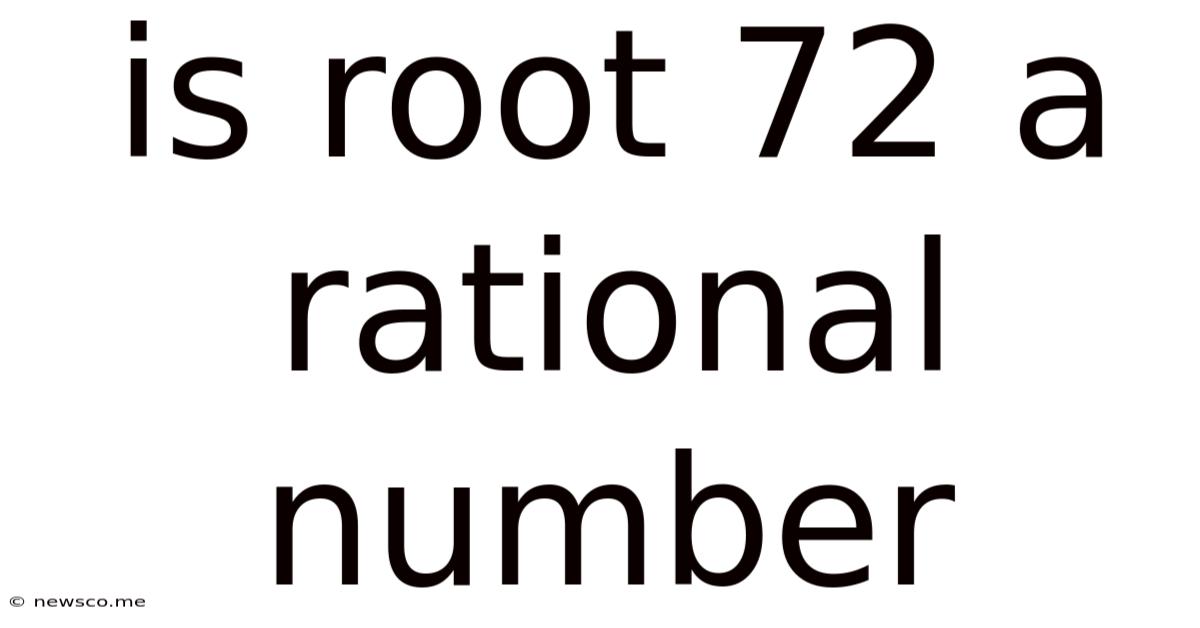Is Root 72 A Rational Number
News Co
Apr 13, 2025 · 5 min read

Table of Contents
Is √72 a Rational Number? A Deep Dive into Irrationality
The question of whether √72 is a rational number is a fundamental concept in mathematics, touching upon the core definitions of rational and irrational numbers. Understanding this requires a solid grasp of number systems and their properties. This article will not only answer the question definitively but also explore the broader concepts surrounding rational and irrational numbers, providing a comprehensive understanding of the topic.
Understanding Rational Numbers
A rational number is any number that can be expressed as a fraction p/q, where 'p' and 'q' are integers, and 'q' is not equal to zero. This seemingly simple definition encompasses a vast range of numbers, including:
- Integers: Whole numbers, both positive and negative (e.g., -3, 0, 5). These can be expressed as fractions with a denominator of 1 (e.g., -3/1, 0/1, 5/1).
- Fractions: Numbers expressed as a ratio of two integers (e.g., 1/2, 3/4, -7/5).
- Terminating Decimals: Decimals that end after a finite number of digits (e.g., 0.25, 0.75, 2.5). These can be converted into fractions (e.g., 0.25 = 1/4, 0.75 = 3/4).
- Repeating Decimals: Decimals with a pattern of digits that repeats infinitely (e.g., 0.333..., 0.142857142857...). These can also be expressed as fractions (e.g., 0.333... = 1/3).
The key characteristic of a rational number is its ability to be represented precisely as a ratio of two integers.
Delving into Irrational Numbers
Irrational numbers, on the other hand, cannot be expressed as a simple fraction p/q. Their decimal representations are non-terminating and non-repeating – they continue infinitely without ever settling into a predictable pattern. Famous examples include:
- π (Pi): The ratio of a circle's circumference to its diameter, approximately 3.14159...
- e (Euler's number): The base of natural logarithms, approximately 2.71828...
- √2 (Square root of 2): This is a classic example, proving that not all square roots are rational.
The existence of irrational numbers significantly expands the realm of numbers beyond the seemingly complete set of rational numbers. They represent points on the number line that cannot be precisely located using fractions.
Analyzing √72: Is it Rational or Irrational?
To determine whether √72 is rational or irrational, we need to simplify the square root and examine its properties.
Simplifying √72:
We can simplify √72 by finding its prime factorization:
72 = 2 x 36 = 2 x 2 x 18 = 2 x 2 x 2 x 9 = 2 x 2 x 2 x 3 x 3 = 2³ x 3²
Therefore, √72 = √(2³ x 3²) = √(2² x 2 x 3²) = 2 x 3 x √2 = 6√2
This simplification reveals that √72 is equivalent to 6 multiplied by the square root of 2. The crucial point here is the presence of √2.
The Irrationality of √2:
It has been proven mathematically (through proof by contradiction, for instance) that √2 is irrational. This means it cannot be expressed as a fraction p/q where p and q are integers. You cannot find two integers that, when divided, result in the exact value of √2.
Conclusion regarding √72:
Since √72 simplifies to 6√2, and √2 is irrational, it follows that √72 is also irrational. Multiplying an irrational number (√2) by a rational number (6) does not change its irrational nature. The result remains an irrational number.
Proofs and Further Exploration
The proof that √2 is irrational is a classic example of a proof by contradiction. It elegantly demonstrates the fundamental difference between rational and irrational numbers. A similar approach could be applied to other square roots, exploring why certain numbers are irrational. Several resources are available online that explain these proofs in detail.
Practical Implications and Applications
While the concept of irrational numbers might seem abstract, they have significant practical implications in various fields:
- Geometry: Irrational numbers frequently appear in geometric calculations involving circles, triangles, and other shapes. For instance, the diagonal of a square with sides of length 1 is √2.
- Physics: Many physical constants and calculations involve irrational numbers, demonstrating the limitations of using only rational numbers to describe the natural world.
- Computer Science: Representing irrational numbers in computers requires approximations, leading to potential inaccuracies in calculations. Understanding the nature of irrational numbers is crucial for managing these limitations.
Addressing Common Misconceptions
A common misconception is that irrational numbers are somehow "less important" or "less real" than rational numbers. This is incorrect. Irrational numbers are just as much a part of the number system as rational numbers, and they are essential for a complete and accurate understanding of mathematics.
Conclusion: Embracing the Irrational
The question of whether √72 is a rational number leads us on a journey into the fascinating world of number systems. We've established conclusively that √72, due to its simplified form 6√2 and the inherent irrationality of √2, is indeed irrational. This exploration underscores the importance of understanding the properties of rational and irrational numbers and highlights their widespread relevance across diverse fields of study. By grasping these fundamental concepts, we develop a more robust understanding of the mathematical world around us. Remember, the beauty of mathematics lies in its ability to connect seemingly abstract ideas to concrete applications, enriching our comprehension of both the theoretical and practical aspects of our world. Further exploration into number theory and the proofs related to irrationality can provide even deeper insights into this captivating subject.
Latest Posts
Related Post
Thank you for visiting our website which covers about Is Root 72 A Rational Number . We hope the information provided has been useful to you. Feel free to contact us if you have any questions or need further assistance. See you next time and don't miss to bookmark.